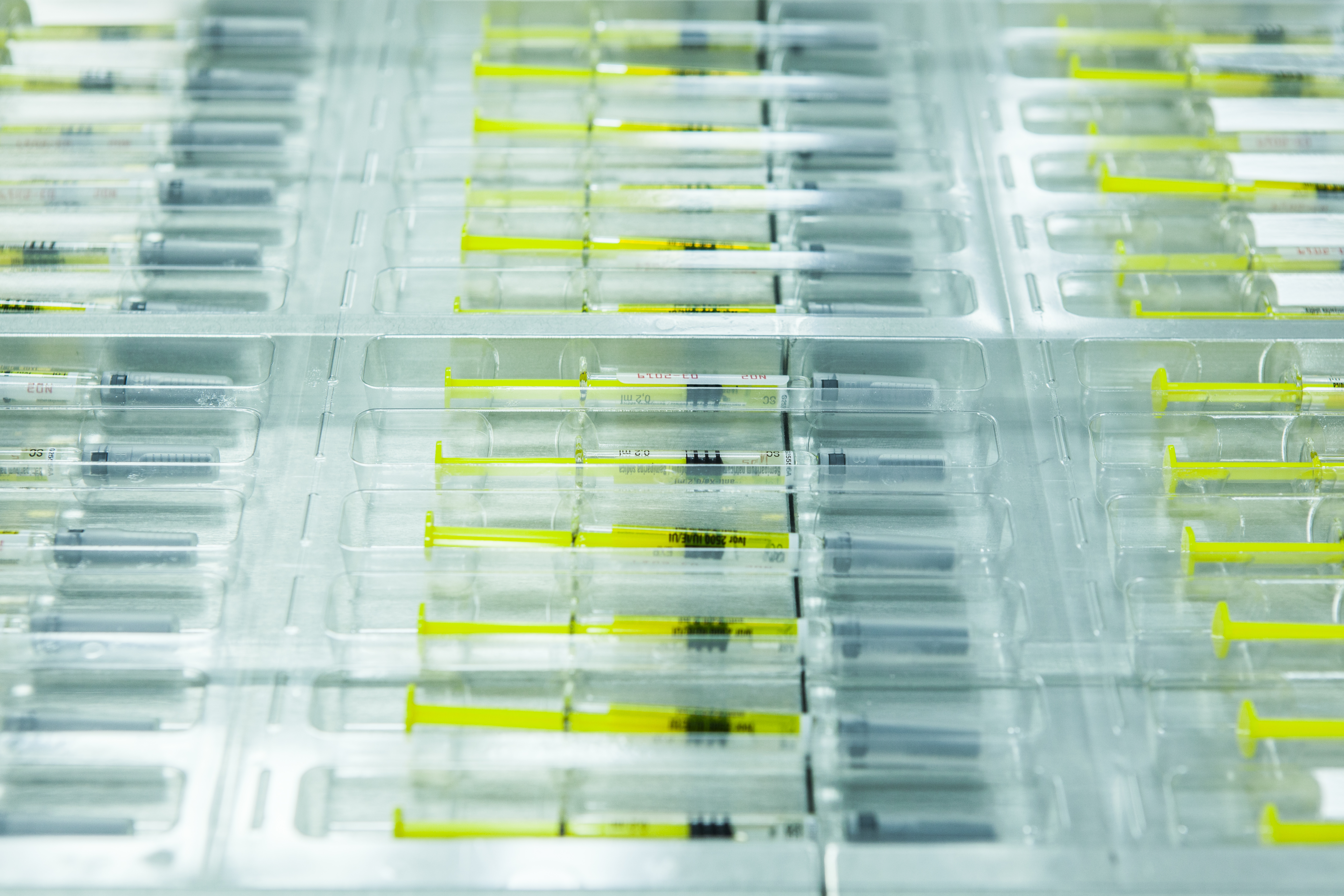Advanced Final Results from the Pivotal Study of its Once-monthly Injectable Antipsychotic show that Primary and Key Secondary Efficacy Endpoints Were Achieved with Both Doses Tested for the Treatment of Patients with Acute Exacerbation of Schizophrenia
Advanced Final Results from the Pivotal Study of its Once-monthly Injectable Antipsychotic show that Primary and Key Secondary Efficacy Endpoints Were Achieved with Both Doses Tested for the Treatment of Patients with Acute Exacerbation of Schizophrenia
A preliminary announcement of the final results from the pivotal study of its once-monthly Injectable antipsychotic shows that primary and key secondary efficacy endpoints were achieved with both doses tested for the treatment of patients with acute exacerbation of schizophrenia.











6S3A6760.jpg
Laboratorios Farmacéuticos Rovi, S.A. (www.rovi.es) today announced topline results from the pivotal study PRISMA-3, a multicenter, randomized, placebo-controlled phase 3 trial of Doria® (Risperidone ISM®), a novel investigational once-monthly injectable antipsychotic for the treatment of schizophrenia. In this study, patients treated with once-monthly doses of either 75 mg or 100 mg of Doria® obtained statistically significant reductions from baseline (p<0.0001) compared to placebo in the Positive and Negative Syndrome Scale (PANSS) total score at week 12, which was the prespecified primary efficacy endpoint in the trial. As expected, the final clinical report will be available by June 2019.
“The positive results of the PRISMA-3 study provide the clinical evidence that Risperidone ISM® allows for a meaningful control of schizophrenia symptoms in patients with an acute illness exacerbation, using once-monthly injections and without needing loading doses or oral supplementation” stated Christoph Correll, M.D., Professor of Psychiatry and Molecular Medicine at the Donald and Barbara Zucker School of Medicine at Hofstra/Northwell in Hempstead, New York. “In view of these results that also documented a favourable safety profile consistent with data known from oral risperidone, I believe that Risperidone ISM®, if approved, may represent a first-line therapeutic option for those schizophrenia patients in whom prescribers, patients and families consider risperidone to be the treatment of choice”.
Both doses of Risperidone ISM® (once-monthly 75 mg and 100 mg), compared to placebo, also showed statistically significant improvement (p<0.0001) in the total score of the Clinical Global Impressions-Severity scale (CGI-S) at 12 weeks, which was the pre-specified key secondary efficacy endpoint in the study.
" It is a great satisfaction to have obtained such good and robust efficacy and safety results with Doria®, which we consequently hope will allow us to make rapid progress with the registration in the US and Europe," said Juan Lopez-Belmonte, CEO of ROVI. "We want to especially thank patients, their caregivers and investigators for their participation in the study, since they have allowed us to get closer to being able to offer a novel therapeutic option that can help improve the management of schizophrenia, still an all-too-often serious, chronic and disabling disease".
Based on these positive results, and the remaining data of the product, ROVI is progressing in its plans to submit an NDA (New Drug Application) to the FDA (Food and Drug Administration) in the second half of 2019.
About the PRISMA-3 study
The pivotal study PRISMA-3 is a multicenter, randomized, double-blind, placebo- controlled clinical trial to evaluate, after a period of 12 weeks, the efficacy and safety of once-monthly intramuscular injections of Risperidone ISM® in patients with acute exacerbation of schizophrenia.
A total of 438 patients were included in the double-blind period of the study and were randomly allocated to receive Risperidone ISM® 75 mg or 100 mg or placebo. At the beginning of the study, patients, of both sexes, were between 18 and 64 years old, were diagnosed with schizophrenia according to the criteria of the Diagnostic and Statistical Manual of Mental Disorders, 5th Edition (DSM-V) and presented an acute exacerbation or relapse of the disease, confirmed by a PANSS total score between 80 and 120 and a CGI-S score greater than or equal to 4.
The prespecified primary efficacy endpoint in the study was the mean change at 12 weeks from baseline value in the PANSS total score, using a Mixed Effects Model with Repeated Measurements (MMRM), with the Hommel’s closed-testing correction procedure for multiple tests. In addition, the study protocol prespecified as a key secondary efficacy endpoint the mean change in the CGI-S total score at 12 weeks compared to the baseline value.
Patients who successfully completed the double-blind period were offered to continue in a long-term, open-label 12-month extension phase with once-monthly injections of Risperidone ISM® (75 mg or 100 mg). New, clinically stable patients ("de novo" patients) have also been able to enter this open phase of the study. The objective of the study extension phase (currently underway) is to check the safety, tolerability and durability of the long- term Risperidone ISM® effect.
About schizophrenia
Schizophrenia is a chronic, serious, and disabling mental disorder that affects about 1% of the population. Schizophrenia patients are characterized by a mixture of psychiatric symptoms, both positive (delusional ideas, hallucinations, disorganized language and behaviour) as negative (affective flattening, speech poverty, abulia) in nature. The disease usually starts at a critical age for personal development, forcing patients in many cases to leave their educational or work activity, resulting in a great deal of suffering for the subjects and their family environment as well as representing an important loss for society at large. It is estimated that approximately 3% to 5% of total health expenditure is devoted to schizophrenia.
About the ISM® technology
ISM® is a Technology Platform for the release of drugs patented by ROVI, which is based on the in situ formation of biodegradable matrices after the administration of a liquid carrier. Its unique characteristics allow to quickly obtain therapeutic levels of the medicine after its administration, without the need to for oral coadministration or additional booster or loading injections to achieve and maintain the levels in a predictable and sustained way, which has a greater likelihood of satisfying the patient's clinical needs.